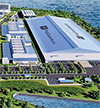21st Century Cures Act May Spur Pharma/ Medical Device Expansions in U.S.
Funding provided by the 21st Century Cures Act, as well changes in FDA approval procedures, may lead pharma and medical device companies to expand their operations, with an eye on U.S. locations to accommodate the new administration’s interventions.
Q1 2017

The bill, which passed by wide margins in the House and Senate, includes $4.8 billion to the National Institutes of Health (NIH). The NIH funding includes $1.4 billion for the president’s precision Medicine Initiative; $1.8 billion for former Vice President Biden’s Cancer Moonshot; and $1.6 billion for the BRAIN (Brain Research Through Advancing Neurotechnologies) initiative. The bill will also provide $500 million in funding to the U.S. Food and Drug Administration (FDA) over 10 years with the goal of getting drugs and medical devices to patients more quickly. Advocates say pharma and device-makers should save billions in R&D costs.
Ed Roach, a managing director with Maetrics, a medical device industry consulting firm, says many are taking a “wait and see” stance on the law. “The theory is to get new cures to market faster. It will certainly help (the device industry and patients) if it is implemented in a way that this actually happens.”
Roach says that in recent years, some changes in FDA regulations have had the effect of lengthening the time to approve new devices and drugs. “Part of this whole initiative is for the FDA to be more educated in its response to various types of devices and the science behind them, to give them a more thorough review. It’s probably the right thing to do; it’s just that, as these programs get started, there is a learning curve.”
Accommodating the New Administration in Washington
How will the act impact growth and expansion by medical device and pharmaceutical companies in the U.S.? Kevin O’Laughlin, a principal with KPMG Strategy who works with life sciences companies, doesn’t expect any of its provisions will have much influence on manufacturing strategies and site selection decisions. But he does anticipate that the Trump administration’s emphasis on retaining manufacturing in the U.S., “and the likely retaliatory measures that will result” for not doing so, will have a significant effect in stimulating facility expansion and new construction, especially for products that are used in the U.S. “We are already seeing manufacturers in other industries re-calibrating expansion plans to accommodate or preclude new administration interventions,” O’Laughlin says. The current climate of opposition to continued globalization - both in the U.S. and Europe - may accelerate the adoption of more decentralized, smaller scale, market-focused manufacturing, particularly in pharma
Industry reps have long contended that the FDA’s approval processes have hampered the growth of the life sciences industries. O’Laughlin believes the changes in FDA procedures stipulated in the act will significantly benefit medical device and pharma companies. “Faster approval processes leveraging data summaries rather than full-blown clinical trials for new indications, for example, are favorable to the industry. And, the ability to promote off-label drug uses to insurance companies is also going to expand markets.”
With Trump’s mandate to reduce federal regulations, O’Laughlin also believes the new administration will push for “significant refocusing of the FDA’s oversight, not as part of the Cures Act but in separate initiatives. What direction this might take is uncertain.”
O’Laughlin also thinks the current climate of opposition to continued globalization — both in the U.S. and Europe — may accelerate the adoption of “more decentralized, smaller scale, market-focused manufacturing, particularly in pharma. “The adoption of continuous manufacturing in pharma (which provides a more scalable manufacturing solution at lower capital cost) will likely be accelerated by some of these macro trends,” McLaughlin says.
Project Announcements
Johnson & Johnson Expands Wilson County, North Carolina, Production Operations
01/16/2026
TransMedics Group Plans Somerville, Massachusetts, Headquarters Operations
01/16/2026
Lithium Battery Company Plans Tampa, Florida, Battery Pack Production Operations
01/10/2026
Eurofins Lancaster Laboratories Expands Lancaster County, Pennsylvania, Research Operations
01/03/2026
Valerie Health Plans Chattanooga, Tennessee, Operations
01/02/2026
Samsung Biologics Plans Rockville, Maryland, Manufacturing Operations
12/31/2025
Most Read
-
The Workforce Bottleneck in America’s Manufacturing Revival
Q4 2025
-
Data Centers in 2025: When Power Became the Gatekeeper
Q4 2025
-
Speed Built In—The Real Differentiator for 2026 Site Selection Projects
Q1 2026
-
Preparing for the Next USMCA Shake-Up
Q4 2025
-
Tariff Shockwaves Hit the Industrial Sector
Q4 2025
-
Top States for Doing Business in 2024: A Continued Legacy of Excellence
Q3 2024
-
Investors Seek Shelter in Food-Focused Real Estate
Q3 2025


